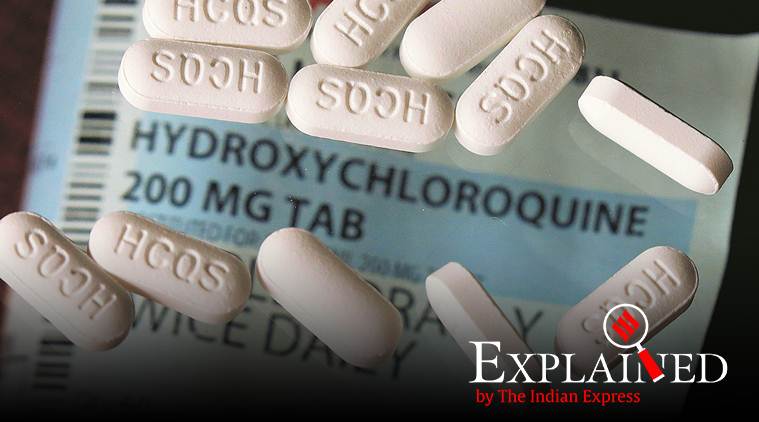- India
- International
Explained: What we know so far on hydroxychloroquine (HCQ)
India has extended guidelines for hydrochloroquine use, a study has raised fresh questions about its efficacy against Covid, and Trump continues to push for it. A look at both sides of the continuing debate.
 Many countries allow HCQ use against Covid-19, with restrictions. (AP)
Many countries allow HCQ use against Covid-19, with restrictions. (AP)
Last week, a study in The Lancet raised further questions about the efficacy of hydroxychloroquine (HCQ) as a treatment for Covid-19. This comes even as US President Donald Trump continues to push for HCQ, including a claim that he has been using it himself.
HCQ has been the subject of debate around the world. It is India’s drug of choice both for treatment and prophylaxis (post-exposure preventive). India has extended guidelines for its use and is currently exporting it to 55 other countries, even though the World Health Organisation (WHO) has been cautious about its efficacy.
What is hydroxychloroquine?
It is a drug used in the treatment of autoimmune diseases such as rheumatoid arthritis and lupus. It is also used for the prevention of malaria and its treatment; it is a derivative of the antimalarial drug chloroquine. On prophylactic use of HCQ for malaria, the US Centers for Disease Control says: “Hydroxychloroquine can only be used in places where chloroquine… is still effective. There are only a few places left in the world where hydroxychloroquine is still effective including parts of Central America and the Caribbean.”
Countries that have allowed use of HCQ for Covid-19, with restrictions, include the US (for emergency use in hospital), France (on prescription), Brazil, Russia and South Korea.
Hydroxychloroquine: Why is it so much in the spotlight?
The prime mover of the theory that HCQ works against Covid-19 has been President Trump, starting with his tweet in March: “HYDROXYCHLOROQUINE & AZITHROMYCIN, taken together, have a real chance to be one of the biggest game changers in the history of medicine. The FDA has moved mountains — Thank You! Hopefully they will BOTH (H works better with A, International Journal of Antimicrobial Agents)…..be put in use IMMEDIATELY. PEOPLE ARE DYING, MOVE FAST, and GOD BLESS EVERYONE!”

A short while later, Trump warned of “retaliation” if India continued with its policy against export of HCQ (India later eased export restrictions). A few days ago, Trump said he uses HCQ for prophylaxis.
How far does Trump’s view reflect in US guidelines and scientific assessment?
The National Institute of Allergy and Infectious Diseases director Dr Anthony Fauci has called the evidence of the efficacy of the combination “anecdotal”.
The US Food and Drug Administration says: “The FDA is aware of reports of serious heart rhythm problems in patients with COVID-19 treated with hydroxychloroquine or chloroquine, often in combination with azithromycin and other QT prolonging medicines. We are also aware of increased use of these medicines through outpatient prescriptions… Hydroxychloroquine and chloroquine have not been shown to be safe and effective for treating or preventing COVID-19. They are being studied in clinical trials for COVID-19, and we authorized their temporary use during the COVID-19 pandemic for treatment of the virus in hospitalized patients when clinical trials are not available, or participation is not feasible, through an Emergency Use Authorization.”
📣 Express Explained is now on Telegram. Click here to join our channel (@ieexplained) and stay updated with the latest
What is the evidence in favour of, or against, the efficacy of HCQ?
There is an emerging body of evidence, often conflicting. The latest, in The Lancet last week, is not encouraging. “We were unable to confirm a benefit of hydroxychloroquine or chloroquine, when used alone or with a macrolide, on in-hospital outcomes for COVID-19. Each of these drug regimens was associated with decreased in-hospital survival and an increased frequency of ventricular arrhythmias when used for treatment of COVID-19,” concluded researchers led by the Brigham and Women’s Hospital. Macrolides are a class of antibiotics that includes azithromycin.
In a small study published in the International Journal of Antimicrobial Agents, published on March 17, French scientists reported: “Twenty cases were treated in this study and showed a significant reduction of the viral carriage at D6-post inclusion compared to controls, and much lower average carrying duration than reported of untreated patients in the literature. Azithromycin added to hydroxychloroquine was significantly more efficient for virus elimination.” In other words, the combination did reduce the viral load. The size of the study, however, is too small for the conclusion to be treated as definitive.
Read | Explained: Hydroxychloroquine use in worst-hit Maharashtra
In an observational study funded by the US National Institutes of Health (NIH), HCQ was not found to be very effective in reducing severity of Covid-19. “… Hydroxychloroquine administration was not associated with either a greatly lowered or an increased risk of the composite end point of intubation or death. Randomized, controlled trials of hydroxychloroquine in patients with Covid-19 are needed,” researchers reported earlier this month in the New England Journal of Medicine. However, there have been ecological studies comparing deaths in countries that have allowed HCQ with those that have not, to claim that the former showed lower death rates.
Among known side effects of HCQ are alterations in heart rates, intestinal problems, headache, dizziness, hallucinations etc.
What is the WHO position on HCQ?
The WHO has said that while there is no conclusive evidence yet of the efficacy of HCQ in Covid-19 treatment, the side-effects are well documented. Dr Michael Ryan, executive director WHO, said during a briefing on Wednesday: “Every sovereign nation with effective regulatory authorities can advise citizens on the use of any drug… Hydroxychloroquine and chloroquine are already licensed products. But they have not as yet been found to be effective in COVID-19 or in prophylaxis… there are warnings by many authorities on potential side effects. Many countries have limited it to clinical trials under supervision of clinicians in hospital settings. However it is for each national authority to weigh and assess the evidence.”
HCQ and CQ along with beta interferons, however, form one arm of the multi-country Solidarity trials that are being carried out under the aegis of the WHO.
What is India’s position?
India on Friday expanded the list of people eligible for prophylactic use of HCQ to include non-healthcare frontline workers. The revised advisory now says: “Joint Monitoring Group and NTF have now recommended the prophylactic use of HCQ in all asymptomatic healthcare workers involved in containment and treatment of COVID19 and asymptomatic healthcare workers working in non-COVID hospitals/non-COVID areas of COVID hospitals/blocks, asymptomatic frontline workers, such as surveillance workers deployed in containment zones and paramilitary/police personnel involved in COVID-19 related activities and asymptomatic household contacts of laboratory confirmed cases.”
The drug, though, is not to be used in people with retinopathy, hypersensitivity to the disease, cardiac problems or glucose 6 phosphate deficiency. It is not to be used in pregnant or lactating mothers of children aged less than 15 years. either. Use of the drug has to be preceded by an ECG.
Data on assessment of HCQ prophylaxis among 1,323 healthcare workers indicated mild adverse effects such as nausea (8.9%), abdominal pain (7.3%), vomiting (1.5%), hypoglycemia (1.7%) and cardio-vascular effects (1.9%). And as per the data from the Pharmacovigilance Program of India, there have been 214 reported instances of adverse drug reactions associated with prophylactic HCQ use. Of these, 7 were serious individual case safety reports with prolongation of QT interval on ECG in 3 cases. The advisory warned: “It is reiterated that the intake of above medicine should not instil a sense of false security.”
The advice for use of the drug along with azithromycin in serious patients of Covid-19 remains. However, last week Dr R R Gangakhedkar director of epidemiology and infectious diseases at the Indian Council of Medical Research said: “We will review the evidence (on hydroxychloroquine) and take a call”. India has in the past discussed population-level prophylactic use of the drug.
More Explained
EXPRESS OPINION
May 09: Latest News
- 01
- 02
- 03
- 04
- 05











































